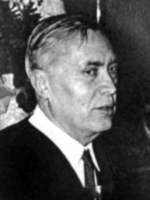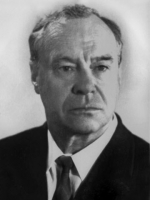In the 110-year history of the KPI cooperation with the National Academy of Sciences of Ukraine is one of the key traditions. Prominent scientists of the Academy, who at the same time worked at the Academy of Sciences and in the KPI, always formed the content of this co-operation. By this way, they provided a high level of scientific training, started in KPI new specialties on training of engineers, the need for which was dictated by the needs of the national economy and national defense.
The life and teaching and research activities of academics Vitaly Nikiforovitch Gridnev and Adrian Anatolyevich Smirnov joined in the KPI and are excellent examples of such cooperation.
 In February 1945, at the request of the Academy of Sciences Vitaly Nikiforovitch Gridnev was sent at the disposal of Ukrainian Academy of Sciences and enlisted senior fellow at the Institute of Ferrous Metallurgy of the USSR Academy of Sciences, and in March 1945 - Associate Professor of metallurgy and heat treatment of the Kiev Polytechnic Institute.
In February 1945, at the request of the Academy of Sciences Vitaly Nikiforovitch Gridnev was sent at the disposal of Ukrainian Academy of Sciences and enlisted senior fellow at the Institute of Ferrous Metallurgy of the USSR Academy of Sciences, and in March 1945 - Associate Professor of metallurgy and heat treatment of the Kiev Polytechnic Institute.
In Kiev, fully revealed the scientific and organizational abilities Vitali Nikiforovitch. He completed the work "phase and concentration changes during heating alloys evtektroidnogo type", which was presented as a doctoral thesis. The defense took place March 29, 1947 at a meeting of the Academic Council of the Institute of Ferrous Metallurgy of the USSR Academy of Sciences. In October 1947 he was awarded the degree of Doctor of Technical Sciences, and in March 1948 he was confirmed in the rank of professor.
In Kiev the scientific and organizational abilities Vitali Nikiforovitch were fully revealed. He completed the work "phase and concentration changes during heating alloys evtektroid type", which was presented as a doctoral thesis. The defense took place March 29, 1947 at a meeting of the Academic Council of the Institute of Ferrous Metallurgy of the USSR Academy of Sciences. In October 1947 he was awarded the degree of Doctor of Technical Sciences, and in March 1948 he was confirmed in the rank of professor.
In August 1947 by the order of the Minister of Higher Education Vitaly Nikiforovitch Gridnev was appointed Deputy Director for Research and Academic Affairs, Kiev Polytechnic Institute. In 1948 he headed the Department of heat treatment of steel Engineering Physics Faculty, which in 1949 was reorganized into the Department of heat treatment and metal physics. In August 1952 V.N.Gridnev was appointed director of the Kiev Polytechnic Institute. In this position he remained for three years.
During the directorship of V.N.Gridnev - 1952-1955 years - the institute has seen many changes aimed at improving the quality of engineers and improving the learning environment. In particular, students who learned and worked at the same time, were exempted from night shifts, obtained leave during the sessions and practice in the workplace. On the basis of the correspondence section in the KPI in 1953 it was opened Correspondence Department, and since 1954/55 in the institute there began training of engineers in the field of electrification of industry and mechanical engineering. Since the 1953-54 academic year, after inclusion in the KPI Kiev Technological Institute of silicates and the Institute of Cinema, the institute began training in new occupations: engineers, operators television studios, electronics, industrial electronics, and mathematical calculating instruments and devices, automation of metallurgical processes, hydro - and electro-acoustics, design and technology of radio equipment, the technology of basic organic synthesis and synthetic rubber. The material-technical base of the KPI was developed. In the 1954/55 academic year it was completed a student dormitory for 550 seats, 60-apartment residential house on the street Nikolsko - Botanical, residential 24-apartment building for professors and teachers at the territory of campus. The isotope laboratory, cinematographic laboratories, laboratory instrumentation and computing machines etc. were opened.
Working in the KPI, Vitaly Nikiforovitch Gridnev personally led the training of engineers on a new specialty "Physics of Metals." Issue of the graduates of this specialty became an important link for the successful development of this research direction in Ukraine and, in particular, the development of the Institute of Metal.
It is with activities V.N.Gridnev in the post of rector KPI there related reconstruction of destroyed during the war buildings Institute, the introduction of new skills to meet the needs of time and new forms of learning, improving the living conditions for the students and faculty members. It was obtained the significant progress in improving the academic qualifications of teachers.
Given the significant contribution Vitaly Nikiforovitch Gridnev to the development of the KPI, April 7, 2006 in the lobby of the building of the Faculty of Engineering Physics the sculptural portrait of this outstanding scientist has been opened.
In 1948, when the KPI there was organized the Engineering Physics Department, a problem of finding of its teaching staff. In Kiev there was the lack of qualified theorists of Metal, so KPI took them across the country.
Attention was drawn to Adrian A. Smirnov - theoretical physicist, Doctor of Physical and Mathematical Sciences. Moving A.A. Smirnov from Sverdlovsk to Kiev was associated with the need to re-acquisition of scientific personnel department. But the leadership of the Ural Branch of the USSR and the Urals State University did not want to let go of the scientist, and the Sverdlovsk regional committee of the CPSU (b) do not even remove him from party registration. Correspondence at the Academy of Sciences of the USSR Council of Ministers and the Council of Ministers on the future of A.A.Smirnov lasted more than 2 years. Here are examples of correspondence.
In the USSR Council of Ministers
 In order to expand the research work in the field of Metal Physics Presidium of the Academy of Sciences USSR has created in Institute of Physics the department of electrical and magnetic properties of metals. To work in this department Presidium of the USSR invited Professor A.A.Smirnov who worked so far in the Ural branch of the Academy of Sciences of the USSR in Sverdlovsk.
In order to expand the research work in the field of Metal Physics Presidium of the Academy of Sciences USSR has created in Institute of Physics the department of electrical and magnetic properties of metals. To work in this department Presidium of the USSR invited Professor A.A.Smirnov who worked so far in the Ural branch of the Academy of Sciences of the USSR in Sverdlovsk.
At the same time, prof. A.A.Smirnov was invited to head the department in the opened in KPI the Engineering Physics Department, which is considered very important and where there is quite specialists in the theory of metals. Presidium of the Academy of Sciences of USSR at first agreed to transfer prof. A.A.Smirnov, but the chairman of the Ural Branch of the USSR Academy I.P.Bardin changed his mind and prepared the order appealed against the Presidium of the USSR Academy of Sciences, as a result of which it has been delayed. Prof. A.A.Smirnov already moved with his family in Kiev and went to work.
The Council of Ministers of the UkSSR asked Council of Ministers of USSR to instruct Presidium of the USSR about upheld previous decisions in translation prof. A.A.Smirnov to Ukrainian Academy of Sciences.
Order of the Ural branch of the Academy of Sciences of the USSR on April 7, 1950
At the request of the Ministry of Higher Education of the USSR from 11.03.1950 № PI-06/329 Director KPI prof. A.A.Smirnov should be considered transered to a permanent job in Kiev Order of Lenin Polytechnic Institute from December 31, 1949.
Thus, in the end, Adrian A. Smirnov was sent to the Kiev Polytechnic Institute, and 1 January 1950, he began working as a professor of physics.
Adrian A. Smirnov worked in Kyiv Polytechnic Institute from 1950 to 1955. A part-time – up to 1957. It was he who headed the Department of Theoretical Physics from 1951 to 1955, reading Course of Theoretical Physics and separate sections of general physics (physics of the atom, electricity).
As the director of the KPI V.N.Gridnev noted, it was a highly qualified specialist, whose lectures were wonderfully clear and methodically thought-out plan of presentation. His lectures were very popular among students.
A.A.Smirnov while working in the KPI was awarded the medal "For Labor Valor" (1950) and the Order "Badge of Honor" (1953.).
